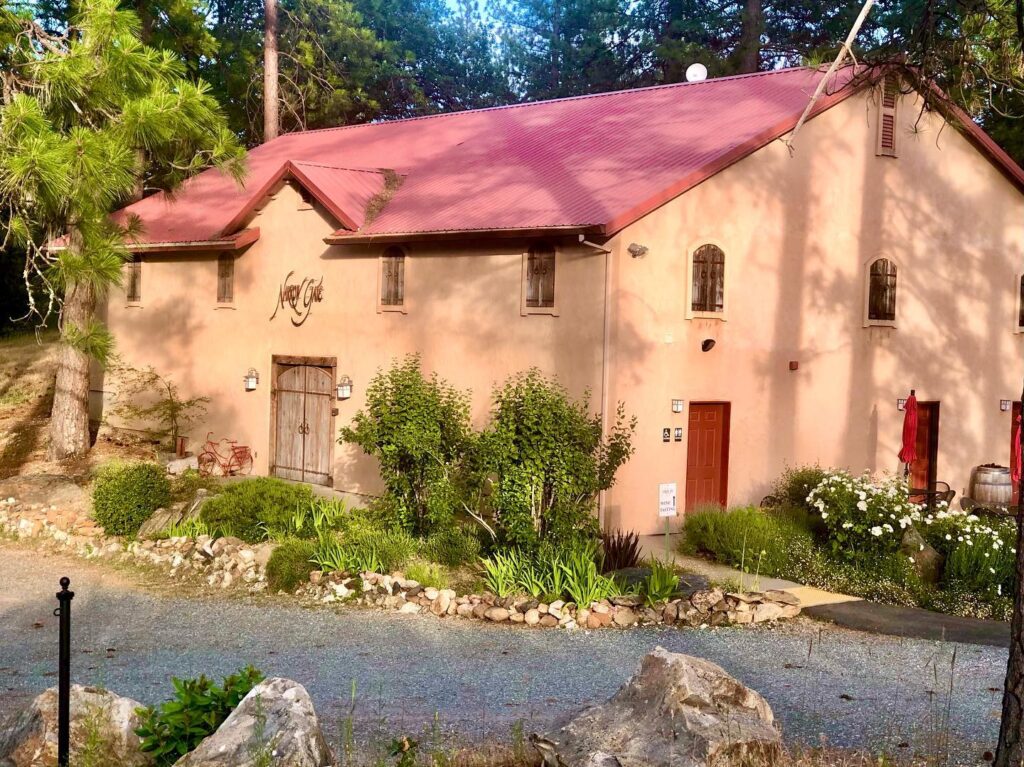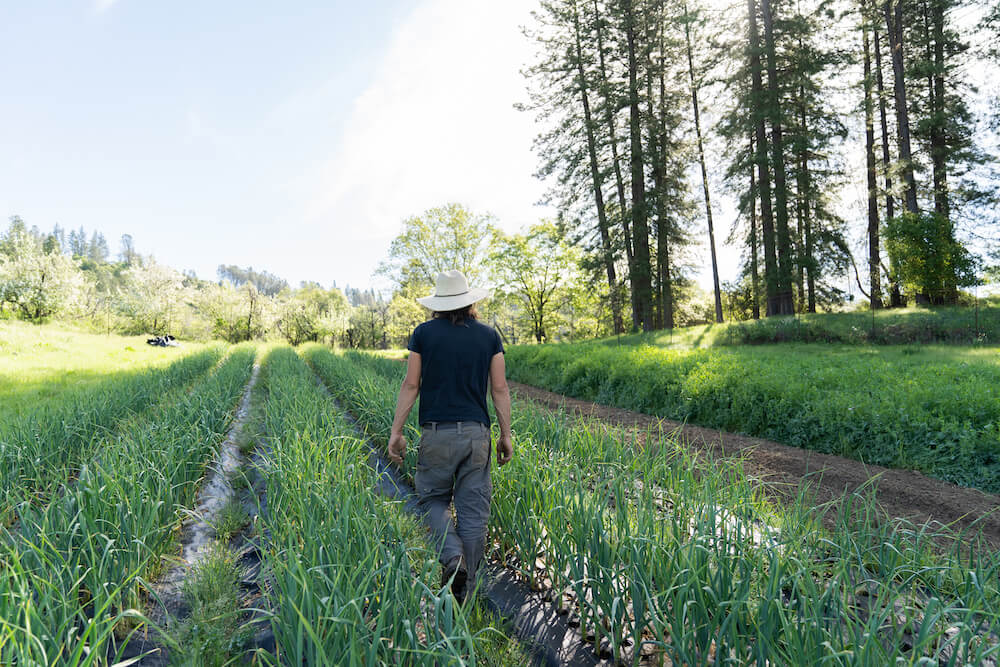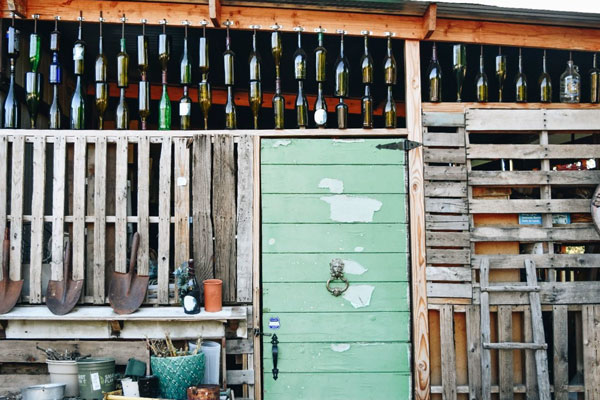By Peter Mead
Here’s how three of our local farmers, two vineyards, and one produce farm bring out the most nature has to offer.
Chateau Davell Winery: Letting nature perfect the grape
At Chateau Davell, owners Eric and Emily Hays produce 17 varietals and blends from rich organic grapes grown, harvested, and vinted using old-world methods paired with modern ecologically-guided craft. Instead of herbicides, pesticides, and chemical fertilizers, Eric “cover crops” his fields: a variety of plants are used to improve biodiversity, control weeds and pests, and enrich grape-growing nutrients in the soil. Their dedication to sustainability and the organic lifestyle extends into the wine-making process itself. Grapes are harvested at their peak and gently pressed. The wine is unfiltered, so the true song of the grape comes through with perfect pitch. All Chateau Davell wines are known for their signature bouquet, flavor, body, and clarity that only a boutique winery can achieve.
The rustic Chateau Davell tasting room is built entirely from repurposed wood, including a long wavy-grained counter made from a huge fallen pine. The wine bottles, corks, and labels are recycled. It’s a popular tourist stop and a hang-out for Chateau Davell Wine Club members. When asked, Emily will tell you that the most common remark she hears from their customers is, “We love all the varieties; so clean and smooth!” She smiles, “They are feeling the art.”
“Sustainability to me is about respect,” says Eric. “We respect the restorative power of nature and how, with the proper stewardship, it allows us to craft wines of exceptional fruit/acid balance, character, and expression. Because our wines are handcrafted in extremely small lots and do not rely on mass-production techniques, we have the freedom to let each vintage speak for itself with minimal interference. You can taste it.”

Narrow Gate Vineyards’ Biodynamic Farming
Frank and Teena Hildebrand’s Narrow Gate Vineyards turns out 1500 cases of wine a year. Their boutique size allows them to produce naturally-crafted wines of distinctive depth and character – a true discovery for travelers who seek new wine experiences.
Narrow Gate Vineyard is a flagship farm for what is known as biodynamic farming. It’s the unification of the entire farm with a natural ecosystem that is diversified, balanced, and fertile. Certification requires a healthy integration of crops and livestock, land set aside for biodiversity, and organic certification of not just the grapevines but of the whole property.
According to Frank, biodynamic farming is better expressed as “regenerative” versus “sustainable.” As Frank puts it, “Nature doesn’t hold to a level. It isn’t static, as the word sustainability seems to imply. It is constantly cycling through connection, growth, and decay. From the microbiome to the grape and on to the wine itself, if you focus on regenerative processes, you are working with the rhythm of nature’s supply and demand. You’ve struck gold, so to speak, and it shows in the wine. It takes a light touch. But boy, that light touch takes a lot of work!”
Nature doesn’t hold to a level. It isn’t static, as the word sustainability seems to imply. It is constantly cycling through connection, growth, and decay. From the microbiome to the grape and on to the wine itself, if you focus on regenerative processes, you are working with the rhythm of nature’s supply and demand.
Frank Hildebrand, Narrow Gate Vineyards
The El Dorado County AVA (American Viticultural Area) is highly regarded for the diversity of its microclimates and its rich mix of volcanic soil, decomposed granite, sandy loam, and clay. Narrow Gate Vineyards produces grapes ideally matched to their terroir. As a result, their varietals have a robust signature, and because no additives have been included for year-to-year consistency, each vintage is the story of a single year, a chapter in the life of a vineyard on the slopes of the Sierra foothills.
According to Teena, many wine lovers seek the healthier benefits of organic and biodynamic wines. Frank adds, “There is a ribbon of pureness and familiarity that runs through all of our wines that our customers pick up on and comment about. That tells me we are on the right path.”

24 Carrot Farms: Nourishing Community Ties
The sharp rise in consumer demand for organic foods and the healthy lifestyles they represent hit a sweet spot with the local buy-direct organic farm model, and nobody does this better than Ben Hansen’s 24 Carrot Farm. Besides providing high-quality produce using sustainable farming practices, 24 Carrot Farm has had an unexpectedly strong impact on the community.
Set within the postcard beauty of the Apple Hill region of Placerville, 24 Carrot Farm is certified organic throughout its 12 acres, offering a dazzling array of vegetables and fruits grown on the premises, as well as products from partnering organic farms and bakeries nearby. Customers can choose from over 35 different kinds of vegetables and fruits just yards from where they were grown. Many say they feel a stronger connection to the land and love all the choices they have.
Because the vegetables and fruits are grown in a sustainable ecological system that ensures dense nutrients are loaded into the crops, the taste and increased energy are immediately apparent. This is one of the reasons people keep coming back, week after week and year after year: it is food that tastes incredible and it promotes well-being. Even vegetable-shy children gobble it all up.
When asked about sustainability, Ben says he prefers the word “community”. “Honest food builds community,” he says. “I’ve seen couples come here with infants, and years later, they are still buying from us, only they have three kids helping fill the cart.”
Customer-friendly “U-Pick” times during certain seasons allow people to roll up their sleeves and pick their own strawberries, flowers, apples, pumpkins, and vegetables. Ben has even set aside some land where less fortunate families can grow their own food.
24 Carrot Farm is a good example of what abounds in El Dorado County: a great quality of life, a generational community, and a long legacy of respect for nature and its gifts.





